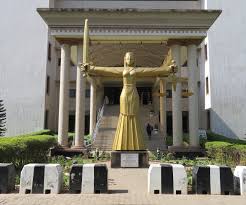Court Ruled In January INEC Can Use Any Method For Results Transmission
The federal high court in Abuja — in a January 23 ruling — dismissed a suit filed by t

.
The federal high court in Abuja — in a January 23 ruling — dismissed a suit filed by the Labour Party (LP) seeking to compel the Independent National Electoral Commission (INEC) to adopt an electronic method for transmitting 2023 election results.
Delivering judgment in the suit marked FHC/ABJ/CS/1454/2022 and filed in August 2022, Emeka Nwite, presiding judge, held that Section 52(2) of the Electoral Act, 2022, cited by Monday Mawah, counsel to LP, provided for voting and transmission of results in accordance with the procedure to be determined by INEC.
According to the judge, the commission is free to specify or pick the method of transmitting election results.
The LP had sought a declaration that the respondent has no power to opt for manual method other than the electronic method provided for by the relevant provisions of the Electoral Act, 2022
The party prayed the court for an order directing/compelling the respondent to comply with the Electoral Act, 2022 on electronic transmission of results in the forthcoming general elections.
INEC neither responded nor filed any process in the suit.
In his judgment, Nwite said: The provision of Section 60(5) of the Electoral Act, 2022 as cited above has provided for the transfer of election results including the total number of the accredited voters from the polling unit.
Section 62(2) on the other hand provides for compilation, maintenance and continuous update of the register of election result as distinct database for all polling units results as collated in all elections conducted by the commission.
This is to say that the commission is at liberty to prescribe or choose the manner in which election results shall be transmitted.
INEC NOT MANDATED TO TRANSMIT RESULTS ELECTRONICALLY’
According to Nwite, Section 60(5) gave the polling unit’s presiding officer the authority to transfer the election results, including the total number of registered voters and the outcomes of the ballot, in a way that INEC would specify.
This is also to say the commission is again at liberty to prescribe to the polling units presiding officers the manner in which to collate and transfer the election results as well as the accredited number of voters in an election under the Act, the judge added.
In view of the foregoing, can the act of the defendant (INEC) in collating and transferring election results manually in the forthcoming 2023 general elections be said to be contrary to the relevant provisions of the Electoral Act, 2022?
The answer can only be in the negative as there is nowhere in the above cited sections where the commission or any of its agents is mandated to only use an electronic means in collating or transferring of election result.
If any, the commission is only mandated to collate and transfer election results and number of accredited voters in a way or manner deemed fit by it.
In view of the above, I find that by the provisions of Sections 50(2) and 60(5) of the Electoral Act, 2022, the correct interpretation of the said statutes is that the defendant (Independent National Electoral Commission) is at liberty to prescribe the manner in which election results could be transmitted and I so hold.
THE POST-ELECTION CONTROVERSY
The electronic transmission of results was one of the contentious issues of the February 25 presidential election.
Many officials of the electoral body were unable to transmit results from polling units, prompting the rejection of the outcome by opposition parties.
In spite of the protest, Bola Tinubu of the All Progressives Congress (APC) was declared winner of the election by INEC.
Peter Obi, presidential candidate of the Labour Party (LP), and Atiku Abubakar of the Peoples Democratic Party (PDP) have instituted suits to challenge his victory in the court of appeal.
...
Advertise on ijawlive.com to reach thousands of our daily users




